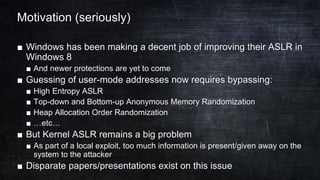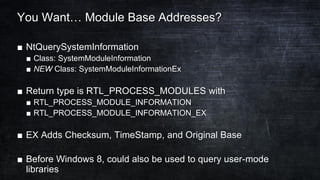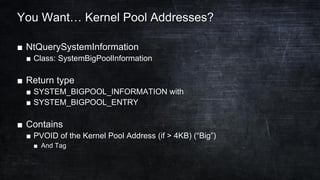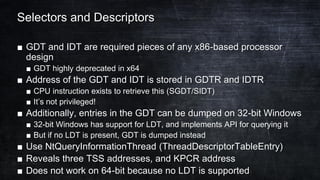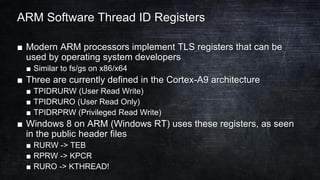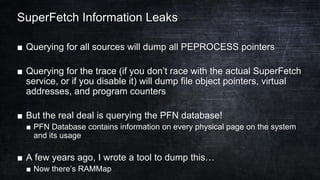Recon2013 alex ionescu-i got 99 problems but a kernel pointer ain't one
- 1. © 2012 CrowdStrike, Inc. All rights reserved. I Got 99 Problem But a Kernel Pointer Ain’t One There’s an info leak party at Ring 0 Alex Ionescu, Chief Architect @aionescu Recon 2013 [email protected]
- 2. Bio ■ Reverse engineered Windows kernel since 1999 ■ Lead kernel developer for ReactOS Project ■ Co-author of Windows Internals 5th and 6th Edition ■ Founded Winsider Seminars & Solutions Inc., to provide services and Windows Internals training for enterprise/government ■ Interned at Apple for a few years (Core Platform Team) ■ Now Chief Architect at CrowdStrike
- 3. Introduction
- 4. Outline ■ Introduction ■ Motivation and Previous Work ■ Old School API Leaks ■ System Design Leaks ■ Tracing/Debugging API Leaks ■ System Memory Leaks ■ SuperFetch Leaks ■ Conclusion
- 5. Motivation ■ Making Spender (grsecurity) troll really hard ■ “Kernel ASLR has never been broken by anyone I know” ■ Got a really well thought out article in response
- 6. Motivation (seriously) ■ Windows has been making a decent job of improving their ASLR in Windows 8 ■ And newer protections are yet to come ■ Guessing of user-mode addresses now requires bypassing: ■ High Entropy ASLR ■ Top-down and Bottom-up Anonymous Memory Randomization ■ Heap Allocation Order Randomization ■ …etc… ■ But Kernel ASLR remains a big problem ■ As part of a local exploit, too much information is present/given away on the system to the attacker ■ Disparate papers/presentations exist on this issue
- 7. Previous Work ■ Too many to list them all ■ Matthew Jurczyk, Tavis Ormandy, Tarjei Mandt & the other usual suspects
- 8. Old School API Leaks
- 9. You Want… Module Base Addresses? ■ NtQuerySystemInformation ■ Class: SystemModuleInformation ■ NEW Class: SystemModuleInformationEx ■ Return type is RTL_PROCESS_MODULES with ■ RTL_PROCESS_MODULE_INFORMATION ■ RTL_PROCESS_MODULE_INFORMATION_EX ■ EX Adds Checksum, TimeStamp, and Original Base ■ Before Windows 8, could also be used to query user-mode libraries
- 10. You Want… All Kernel Object Addresses? ■ NtQuerySystemInformation ■ Class: SystemObjectInformation ■ Return type is SYSTEM_OBJECT_INFORMATION ■ Contains ■ PVOID of the Kernel Object Address ■ PEPROCESS of the Kernel Object Creator ■ Requires the object type/system to enable “Maintain Type List”
- 11. You Want… Named Kernel Object Addresses? ■ NtQuerySystemInformation ■ Class: SystemHandleInformation ■ NEW Class: SystemHandleInformationEx ■ Return type ■ SYSTEM_HANDLE_INFORMATION(_EX) ■ Contains ■ PVOID of the Kernel Object Address ■ HANDLE value in the process ■ Only returns 16-bit handles and PIDs – must use Ex version
- 12. You Want… Kernel Lock Addresses? ■ NtQuerySystemInformation ■ Class: SystemLockInformation ■ Return type ■ RTL_PROCESS_LOCKS with ■ RTL_PROCESS_LOCK_INFORMATION ■ Contains ■ PVOID of the Kernel Resource ■ PVOID of Kernel Thread Owner
- 13. You Want… Kernel Stack Addresses? ■ NtQuerySystemInformation ■ Class: SystemExtendedProcessInformation ■ Return type ■ SYSTEM_EXTENDED_THREAD_INFORMATION ■ Contains ■ PVOID of the Kernel Stack Base and Kernel Stack Limit ■ PVOID of the TEB
- 14. You Want… Kernel Pool Addresses? ■ NtQuerySystemInformation ■ Class: SystemBigPoolInformation ■ Return type ■ SYSTEM_BIGPOOL_INFORMATION with ■ SYSTEM_BIGPOOL_ENTRY ■ Contains ■ PVOID of the Kernel Pool Address (if > 4KB) (“Big”) ■ And Tag
- 16. Selectors and Descriptors ■ GDT and IDT are required pieces of any x86-based processor design ■ GDT highly deprecated in x64 ■ Address of the GDT and IDT is stored in GDTR and IDTR ■ CPU instruction exists to retrieve this (SGDT/SIDT) ■ It’s not privileged! ■ Additionally, entries in the GDT can be dumped on 32-bit Windows ■ 32-bit Windows has support for LDT, and implements API for querying it ■ But if no LDT is present, GDT is dumped instead ■ Use NtQueryInformationThread (ThreadDescriptorTableEntry) ■ Reveals three TSS addresses, and KPCR address ■ Does not work on 64-bit because no LDT is supported
- 17. ARM Software Thread ID Registers ■ Modern ARM processors implement TLS registers that can be used by operating system developers ■ Similar to fs/gs on x86/x64 ■ Three are currently defined in the Cortex-A9 architecture ■ TPIDRURW (User Read Write) ■ TPIDRURO (User Read Only) ■ TPIDRPRW (Privileged Read Write) ■ Windows 8 on ARM (Windows RT) uses these registers, as seen in the public header files ■ RURW -> TEB ■ RPRW -> KPCR ■ RURO -> KTHREAD!
- 18. ACPI Table Data ■ DevicePhysicalMemory was accessible up until Windows Server 2003 SP1 in order to dump contents of RAM as desired ■ Functionality was removed, but replaced with new API for ■ ACPI, SMBIOS, and 0xC0000->0xE0000 memory access ■ NtQuerySystemInformation ■ Class: SystemFirmwareTableInformation ■ Use SYSTEM_FIRMWARE_TABLE_INFORMATION ■ Tables can store physical (RAM) addresses to devices and EFI
- 19. Trap Handler Leaks ■ Worked with a lot of these while writing ReactOS… ■ As an optimization, the kernel does not always build an SEH frame during certain operations ■ Such as a system call ■ Instead, the page fault handler recognizes if the exception came from one such optimized location ■ And does correct exception handling back to user-mode ■ However, this is based on reading the EIP! ■ Playing guessing games with the EIP can reveal kernel addresses based on the exception generated ■ “j00ru” also discovered that some of these checks make crazy assumptions about other registers -> can cause crashes
- 21. Win32k Shared Memory Regions ■ Two “heaps” are implemented by the window management system ■ Session Heap (contains the object handle table) ■ Desktop Heap (contains the objects themselves) ■ To get session heap: user32!gSharedInfo ■ aheList -> Session Heap Start (handle table) ■ ulSharedDelta Difference between user and kernel ■ To get desktop heap: TEB->Win32ClientInfo ■ pvDesktopBase Desktop Heap Start ■ ulClientDelta Difference between user and kernel
- 22. Win32k Objects ■ Win32k Window Manager Handle Entries contain ■ PVOID of the Win32k Object (many/most are mapped in user-space) ■ PVOID of the NT Kernel Object owner (PETHREAD and/or PEPROCESS) ■ Other structures are tagDESKTOPINFO, tagSHAREDINFO, tagCLIENTTHREADINFO, tagDISPLAYINFO, tagSERVERINFO ■ These leak addresses of pointers inside kernel mode memory as well as things like mouse cursor position, last keys states… ■ The objects themselves contain many pointers to NT objects/addreses
- 23. HAL Heap ■ When the HAL initializes extremely early in the boot process, it does not have access to any memory management functionality ■ The boot loader, HAL, and kernel’s memory manager all collaborate to define a region of memory reserved for the HAL ■ 0xFFD00000->0xFFFFFFFF is for the HAL (even on x64) ■ !halpte shows current mappings on x86 ■ hal!HalpHeapStart shows start of the heap ■ Used to store ACPI tables, as well as all the HAL Objects on Windows 8
- 25. Trace-Based ETW/WMI Leaks ■ The kernel has extensive tracing performed through either legacy Windows Management Instrumentation (WMI) or Event Tracing for Windows (ETW) ■ The relevant (documented) APIs are ■ StartTrace ■ ProcessTrace ■ Many of these come from “MSNT_SystemTrace” ■ See http://msdn.microsoft.com/en- us/library/windows/desktop/aa364083(v=vs.85).aspx ■ System Profiling Privilege is required
- 26. You Want… Kernel Process Pointers? ■ ETW “Crimson” Provider ■ Or Legacy WMI ■ PERF_PROC ■ Return type ■ WMI_PROCESS_INFORMATION ■ Contains ■ PVOID of the Kernel Object Address (“UniqueProcessKey”) ■ PVOID of the Process Page Directory (“DirectoryTableBase”)
- 27. You Want… Kernel Thread Pointers? ■ ETW “Crimson” Provider ■ Or Legacy WMI ■ PERF_THREAD ■ Return type ■ WMI_EXTENDED_THREAD_INFORMATION ■ Contains ■ PVOID of the Kernel Stack Base and Stack Limit ■ PVOID of the Kernel Start Address
- 28. You Want… Kernel Spinlock Addresses? ■ ETW “Crimson” Provider ■ PERF_SPINLOCK ■ Return type ■ WMI_SPINLOCK ■ Contains ■ PVOID of the Kernel Spinlock Address ■ PVOID of the Kernel Caller Address ■ And if Address is DPC or ISR
- 29. You Want… Kernel Resource Addresses? ■ ETW “Crimson” Provider ■ PERF_RESOURCE ■ Return type ■ WMI_RESOURCE ■ Contains ■ PVOID of the Kernel Resource Address
- 30. You Want… Kernel IRP and File Object Addresses? ■ ETW “Crimson” Provider ■ PERF_FILENAME ■ EVENT_TRACE_FLAG_DISK_IO ■ Return type ■ WMI_DISKIO_READWRITE ■ PERFINFO_FILE_INFORMATION/FILE_READ_WRITE ■ Contains ■ PVOID of the IRP ■ PVOID of the FILE_OBJECT
- 31. You Want… Kernel Page Fault Addresses? ■ ETW “Crimson” Provider ■ PERF_ALL_FAULTS ■ Return type ■ WMI_PAGE_FAULT ■ Contains ■ PVOID of the Fault Address ■ PVOID of the Program Counter
- 32. And there’s more… ■ DPC/ISR Tracing reveals the kernel pointer of every interrupt and DPC handler ■ Image Load Tracing reveals kernel base address of every kernel module ■ Pool Tracing reveals kernel address of every pool allocation ■ Even non-big ones ■ New Windows 8 Object/handle-based Notifications ■ Leak the Kernel Object Pointer (and handle)
- 33. Triage Dumps ■ NtSystemDebugControl was a goldmine API in Windows XP ■ Allowed complete Ring 0 control from Ring 3 ■ In Server 2003 SP1, almost all commands were disabled ■ A driver, kldbgdrv.sys is used by WinDBG instead ■ Calls KdSystemDebugControl, which checks if /DEBUG is active ■ In Vista, a new command was added, and allowed even without being in /DEBUG mode ■ SYSDBG_COMMAND::SysDbgGetTriageDump ■ Debug Privilege is required
- 34. What’s in a Triage Dump? ■ A typical crash dump header ■ KPCR, KPRCB, KUSER_SHARED_DATA, DPC Queues, Timer Table, etc… ■ Information on the process that was selected for the dump ■ PEPROCESS structure and relevant fields ■ Information on all the threads part of the process selected ■ PETHREAD structure and relevant fields ■ APC queue, pending IRPs, and wait queues ■ Kernel Stack Trace and Context ■ And then Win32k “callback“ gets called… ■ Dumps all tagTHREADINFO + tagPROCESSINFO ■ Dumps all global variables!
- 36. What’s SuperFetch? ■ System component that tracks usage patterns and activities across one or multiple users on the machine ■ Application Launch ■ System Power Transitions ■ User Session Transitions ■ Also tracks usage ■ All File I/O ■ All Page Faults ■ Builds predictive database of application launches (Markov chain) and informs memory manager of priorities that each page should be given in memory and in the cache ■ Based on usage patterns over periods of up to 6 months
- 37. SuperFetch API ■ SuperFetch lives in user-mode! ■ sysmain.dll service inside one of the hosts ■ How does it track all page faults and File I/O ■ Partially through IOCTLs to FileInfo driver ■ Partially through undocumented API ■ NtQuerySystemInformation ■ Class: SystemSuperfetchInformation ■ Implements a variety of subclasses…
- 38. SuperFetch Information Subclasses ■ SUPERFETCH_INFORMATION must be the buffer passed in ■ SUPERFETCH_INFORMATION_CLASS determines the operation ■ Query all “sources” ■ Dump memory lists ■ Dump PFN database and page usages ■ ~12 total queries in Win7, ~20 in Win8 ■ Need version number (45 on Windows 7) ■ Need “magic password” (‘Chuk’) ■ Need System Profile privilege
- 39. SuperFetch Information Leaks ■ Querying for all sources will dump all PEPROCESS pointers ■ Querying for the trace (if you don’t race with the actual SuperFetch service, or if you disable it) will dump file object pointers, virtual addresses, and program counters ■ But the real deal is querying the PFN database! ■ PFN Database contains information on every physical page on the system and its usage ■ A few years ago, I wrote a tool to dump this… ■ Now there’s RAMMap
- 40. Conclusion
- 41. Key Takeaways ■ Unlike certain platforms such as iOS/OS X where kernel information disclosures seem to be taken rather seriously (even the GDT/IDT is aliased to prevent leaking the kernel base address!), Windows has a rather liberal policy toward kernel pointers ■ Not quite as bad as Linux, however. Microsoft does care. ■ Why don’t they “fix” these? ■ Most of the times, the answer is app compatibility ■ Other times, it’s developer support/requests ■ However, requiring admin rights across the board for such system- level APIs may hit the right balance ■ That’s not enough for DRM/Surface environments, however
- 42. Further Reading ■ The NDK (Native Development Kit) is a header kit that I maintain which has the closest possible undocumented structure definitions ■ Even “j00ru” used old/incorrect/unknown structures in his papers ■ NDK was built with information from PDBs, ASSERTs (before NT_ASSERT), private PDB (yep… the Windows 8 ones are still on the symbol server….) and .h leaks over the years, etc… ■ *NO* source code leak/etc material used. ■ J00ru’s blog and most recent talks at CONFidence 2013 and Syscan 2013
- 43. QA ■ Greetz/shouts to: j00ru, msuiche, lilhoser






